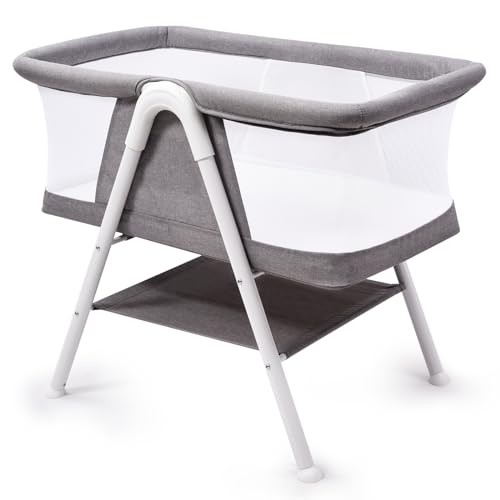The Next Big Event In The Bedside Cot For Baby's Room Industry
The Ultimate Guide to Choosing a Bedside Cot for Your Baby's Room
As new parents prepare to welcome their kids, among the most pressing issues is developing a safe and comfortable sleeping environment. A bedside cot is an increasingly popular option, supplying convenience and peace of mind. This short article checks out the advantages of bedside cots, essential features to think about, their benefits over conventional cots, and answers to regularly asked concerns.
What is a Bedside Cot?
A bedside cot, likewise known as a co-sleeper or side-sleeper cot, is developed to connect safely to the side of the moms and dad's bed. Portable Bedside Crib sleeping option enables easy availability, allowing parents to tend to their baby's requirements without the need to leave their own sleeping space. This convenience cultivates a bonding experience, as parents can easily reach their baby for feedings and convenience throughout the night.
Benefits of Using a Bedside Cot
Bedside cots use numerous advantages that conventional cribs might not offer. Here are some essential benefits:
- Convenience: Bedside cots permit parents to be near to their baby without jeopardizing space or security.
- Security: Many bedside cots meet safety standards and design features to ensure the baby can not present onto the flooring.
- Breastfeeding Friendly: Mothers can easily breastfeed during the night without needing to get out of bed.
- Easier Sleep Training: Bedside cots can make sleep training much easier as babies feel safe and secure being close to their parents.
Secret Features to Consider When Choosing a Bedside Cot
When choosing the ideal bedside cot for your baby's room, keep in mind the following necessary functions:
1. Safety Standards
- Ensure the cot meets regional security regulations and standards. Search for a cot that has breathable mesh sides for much better ventilation.
2. Height Adjustment
- Look for a cot with adjustable heights to fit your bed's level, permitting a protected fit and minimizing the threat of spaces.
3. Stability
- Guarantee the cot has a durable frame to avoid tipping. Stability is essential for security.
4. Mobility
- If travel is anticipated, consider a light-weight design that can easily fold or disassemble.
5. Convertible Features
- Some cots can convert to a bassinet or playpen, permitting for extended use beyond infancy.
6. Mattress Quality
- Examine for a company, correctly fitted bed mattress that fulfills security requirements to support the infant's delicate body.
7. Reduce of Assembly
- A cot that is easy to assemble and disassemble can conserve time and aggravation, especially for new parents.
8. Price Range
- Spending plans can differ; determine in advance how much you are ready to spend on a bedside cot.
Contrasts: Bedside Cot vs. Traditional Cot
Feature
Bedside Cot
Standard Cot
Ease of access
Easy access from bed
Requires complete movement to reach baby
Co-sleeping Functionality
Designed for co-sleeping
Not suitable for co-sleeping
Size
Usually smaller for space efficiency
Standard crib size
Mobility
Typically more portable
Heavier and less portable
Connection with Parent
Directly attached to the parent's bed
Freestanding, requiring distance
Adaptability
Can convert and adjust to different stages
Mainly for setting infant down
Regularly Asked Questions (FAQs)
1. Are bedside cots safe for newborns?
Yes, if correctly established according to safety guidelines and attached securely to the parent's bed, bedside cots are safe for newborns.
2. Baby Co Sleeper Crib cot avoid SIDS (Sudden Infant Death Syndrome)?
While no cot can ensure avoidance of SIDS, utilizing a bedside cot encourages safe sleep practices, allowing parents to monitor their baby carefully.
3. The length of time can a baby use a bedside cot?
Normally, babies can use a bedside cot from birth as much as around 6 months old, depending upon the specific weight and height limits set by the manufacturer.
4. Do bedside cots come with a bed mattress?
A lot of bedside cots include a bed mattress; however, it's essential to examine that it complies with safety requirements and fits well within the cot to avoid spaces.
5. Can you use a bedside cot with a bed that has a high frame?
Yes, numerous bedside cots include adjustable heights to accommodate different bed heights. Always determine Baby Co Sleeper Crib to guarantee a correct fit.
6. What is the best material for a bedside cot?
Try to find natural products such as strong wood or natural materials that are totally free from hazardous chemicals, guaranteeing a safe environment for your baby.
A bedside cot can significantly improve the experience of new parents, providing the ease of access and safety required during the newborn stage. With careful factor to consider of the functions outlined above, parents can pick a bedside cot that best fits their family's requirements. By investing in a quality bedside cot, parents can delight in more peaceful nights, understanding their baby is close by, protect, and comfortable.
Secret Takeaways
- Bedside cots provide convenience, safety, and convenience for both parent and baby.
- Crucial functions to think about include safety standards, stability, and size.
- Constantly ensure you pick a cot that meets safety policies and suits your way of life.
Creating a supporting environment for a baby doesn't end with the cot choice but begins there, offering comfort and security for a restful night's sleep.
